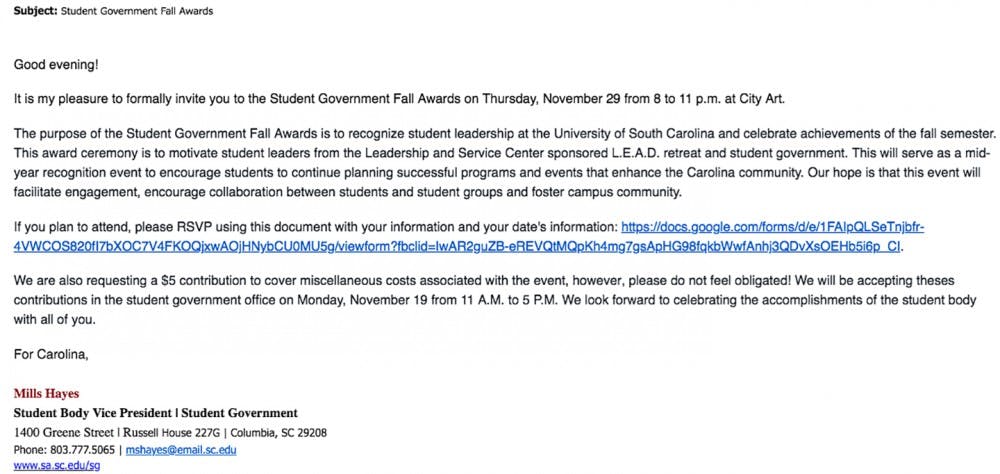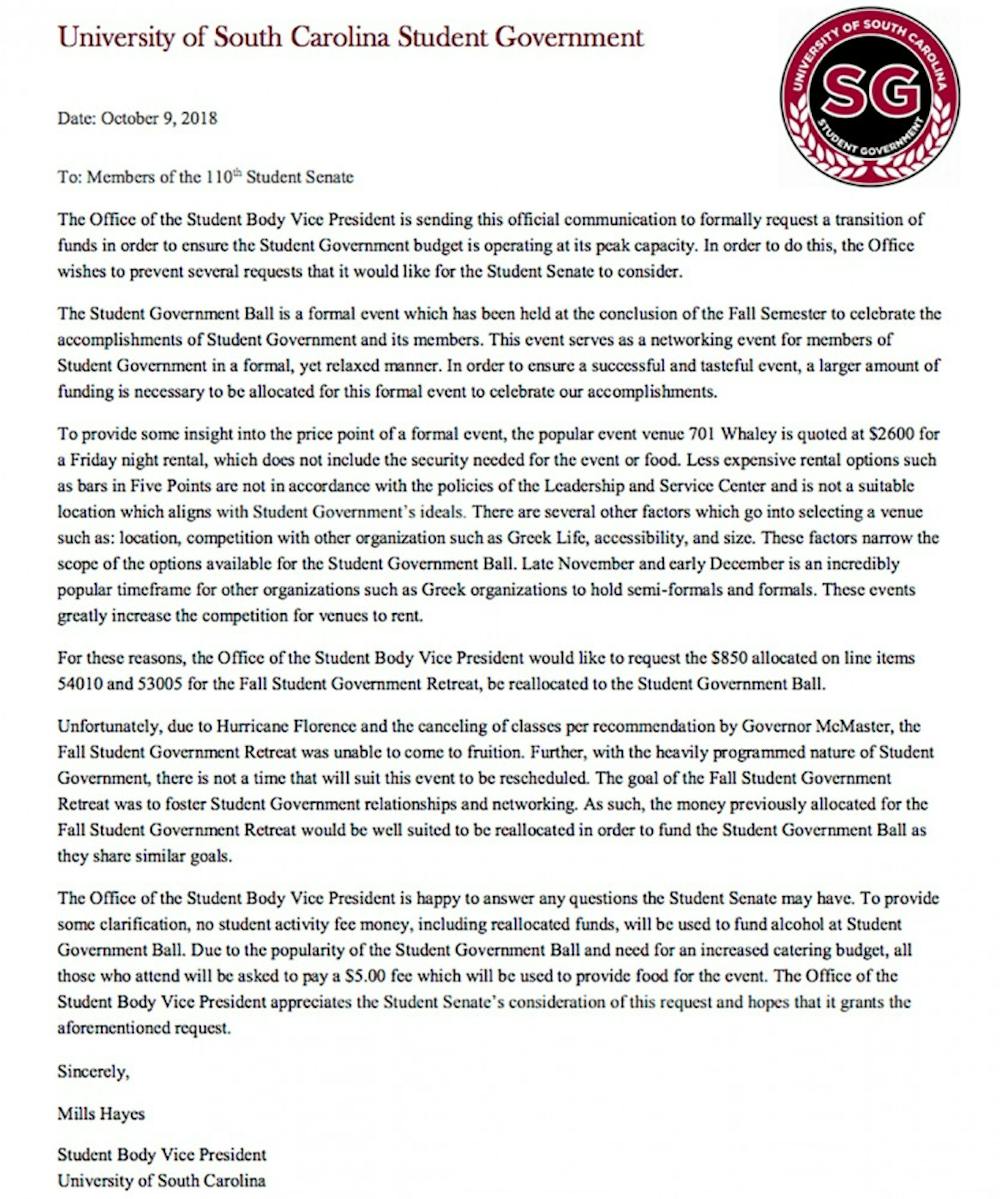Student Government, to many, isn’t an everyday concern. After all, despite record turnout in the last election, only 27.3 percent of the student body voted.
However, there's at least one reason to pay attention to Student Government. They manage quite a bit of our money.
Our recent coverage of Student Government finances have revealed a complex system with multiple flaws — namely, the fact that Student Government, on more than one occasion, has operated under the assumption that they play by a different set of rules than the rest of us. While this is all well and good in a world where they do nothing, that’s simply not our world.
Student Government controls a budget of over $200,000, which is all money we pay into via a Student Activity Fee. Our issue is not with the fee itself, though, because it helps fund the plethora of on-campus student organizations that provide us with a wide variety of experiences. No, our problem is rather how Student Government manages this money.

To start, Student Government codes dictate how they’re able to allocate funds. According to Sections 3-6-70 and 3-6-10 of the Student Government Codes, Student Government is restricted from funding “food and expenses for regularly scheduled meetings,” “clothing purchases” and “equipment” (i.e., inventoriable items). Despite this, Student Government set aside funding in its budget for monthly meeting food, office supplies, trophies, office photos, polo shirts for executives, name plates and T-shirts.

What's more troubling is that when asked to account for these potential violations, our reporter received two different answers. The first was given by Senate Finance Committee Chair Sam Sisney and Mohamed Soluiman, assistant director of finance for the Department of Student Life and the adviser for the Senate Finance Committee. Both stated that the money for these items came not from a fund controlled by Student Government codes (which allocates funding for student organizations), but from the Student Government Operations fund.
Apparently, the operations fund follows a different set of rules than those that apply to student organizations. However, at the time of this editorial’s publication, The Daily Gamecock has not viewed or received the separate codes that apply to the operations fund – despite the fact that our reporter has asked to review them.
The other answer we received was from Student Body President Taylor Wright and Student Body Treasurer Emerson Odagis. Wright, who was responsible for signing off on the budget, “acknowledged the breach of the organization’s codes and said the money designated for the food has been transferred to a budget line item called the New Initiative Fund.”
Odagis, who was responsible for creating the budget, confirmed that the money had been moved. However, we are unable to confirm this directly, as Odagis did not provide our reporter with information that was specific enough regarding its transfer.
This discrepancy between responses is troubling. As we see it, there are two possible situations occurring.
First, the rules regarding the management of the operations fund may not exist – meaning that the Senate Finance Committee did, in fact, pass a budget that was in violation of Student Government codes. This would indicate that the Senate Finance Committee is unaware of rules and regulations dictating their actions – a disconcerting situation as the committee is also responsible for approving or denying funding to student organizations.
It would also mean that Odagis and Wright created and approved a budget in direct violation of the codes, which is what Wright believes is the case.
A second and perhaps more worrisome situation, is that Wright is wrong and that there are specific codes managing allocations from the operations fund. This would mean that Wright, who signed the budget, and Odagis, who supposedly moved the funds to the New Initiative Fund after the fact, are grossly misinformed of the codes governing their own organization.
While this would mean that no violations occurred, it would also mean that two of the most powerful members of Student Government have no idea what rules apply to them.
We wish we could say that this is the end of our problems with actions taken by Student Government. Unfortunately, Student Body Vice President Mills Hayes has also created another, perhaps even more egregious, situation.
Every year, Student Government hosts the Student Government Fall Awards (formerly known as the Student Government Ball). This event has been expensive in years past, and this year is no different.
However, the circumstances surrounding these costs and the rollout of the event itself are what trouble us.
To begin, let’s focus on the budget for the event.
Originally, Student Government set aside $1,500 for the Fall Awards. However, this amount quickly jumped to $2,350 after Wright and Hayes decided that Russell House just wasn’t good enough for such a “prestigious” event.
Wright’s justification for the move was that “you kind of gain something with having a change of scenery” and that “we’re in here every day, so I think it’s kind of fun to leave Russell House and get to meet people outside of a professional setting.” This, of course, necessitated more funding, funding Hayes justified by arguing that it was needed to “ensure a successful and tasteful event.”
Mind you, their need for pomp and circumstance was all paid for by students.
Given that it was all paid for by students, one would expect entry to be open to everyone. The Student Government Codes require this.
But if you’re wondering why you weren’t invited, don’t be. An invitation was sent out, but only a select group of people received it. You still could’ve shown up, but chances are there wouldn’t be room for you. In moving the event away from Russell House, Hayes selected City Art, a venue with a max capacity of 300 people. The Russell House Ballroom’s is 650.

In effect, Hayes and company created a way over budget, exclusive event. Credit to her, she did try to alleviate this budgetary problem by asking those attending to donate $5 to cover the costs. On the other hand, asking for donations from students because you can’t properly manage their money is pretty tasteless and irresponsible. On top of this, a member of Hayes’ or Odagis’ staff messed up some coding on their budget’s spreadsheet and, instead of being $30 over budget, they were actually $97 over. While this has since been corrected, it was only fixed when our reporter pointed it out and explained it to them. Student Government at its finest.
Hayes’ excuse for going over budget was similarly ridiculous, "it’s easier to go over than under, because if we went under, we can’t keep those people’s money, like the donation stuff.” Perhaps if Hayes understood the value of a dollar to students, she wouldn’t spend other people’s money so excessively.
If the event had gone off without a hitch, this mismanagement and incompetence would’ve been bad enough. Unfortunately, this was not the case.
The actual implementation of the Fall Awards was a nightmare. According to our reporting, the event was forced to end early after at least two attendees vomited in the venue and had to be taken out of the building. One of these attendees was later taken away by ambulance.
Given that this was a university event, it, in theory, should’ve been a sober affair. While we understand that this is not always possible to enforce, the Student Government members that planned the event (Mills Hayes, in particular) should’ve taken steps to prevent such a situation from occurring. This is particularly important as Student Government was representing the university in their off-campus event. Student Government bears responsibility for this mess of a situation which has tarnished the university’s image in the community.
These two events – budgetary confusion and an excessively boozy awards night – are signs of a deeper problem within Student Government – an impressive lack of regulation and oversight.
As we at The Daily Gamecock see it, Student Government at South Carolina, in its current form, is too incompetent to handle the mass of student money they manage. The president, vice president and treasurer of Student Government have all shown themselves to be unaware of their own codes (in the case of the Wright and Odagis) or intent on wasting student money for a taste of posh exclusivity (in the case of Wright and Hayes). Frankly, it is our opinion that they should face some consequence for this ineptitude and flagrant overspending.
Even if this does not come to pass, Student Government, as a whole, should have more concrete regulations regarding how they spend our money. For starters, Student Government should be held to the same rules as every other student organization when it comes to the Student Government codes. They are not any different from the rest of us (besides, perhaps, in all that time they waste discussing pizza toppings and writing meaningless bills) and should be treated the same. Furthermore, regulations should be put in place to make sure that there are consequences for breaking the code. As it stands, the only real option lies with the Student Senate initiating impeachment – a “who watches the watchmen” scenario.
More oversight from the Department of Student Life could also be useful. This oversight could catch code violations, limit overspending and could create an environment in which students know their money is being spent appropriately.
The Department of Student Life could also play a role in training new members of Student Government – including those ascending to executive office – to make sure they’re aware of the codes and can budget within their confines. They should also play a role in enforcing regulations, allowing impeachment to still exist as an inter-body check on members, while giving Student Life the ability to handle code violations promptly and without political considerations.
Finally, the role Student Government plays at South Carolina should be discussed as a serious topic. Are they a club for wannabe politicians? Are they a résumé booster? Or are they simply a body that manages student money? Too often, in writing this editorial board, we have to ask ourselves these same questions.
Student Government should be a representative body beholden to the students of the university. They should take themselves and the responsibility that comes with spending student money seriously. If they are unable to do that, then they are incapable of holding office.

